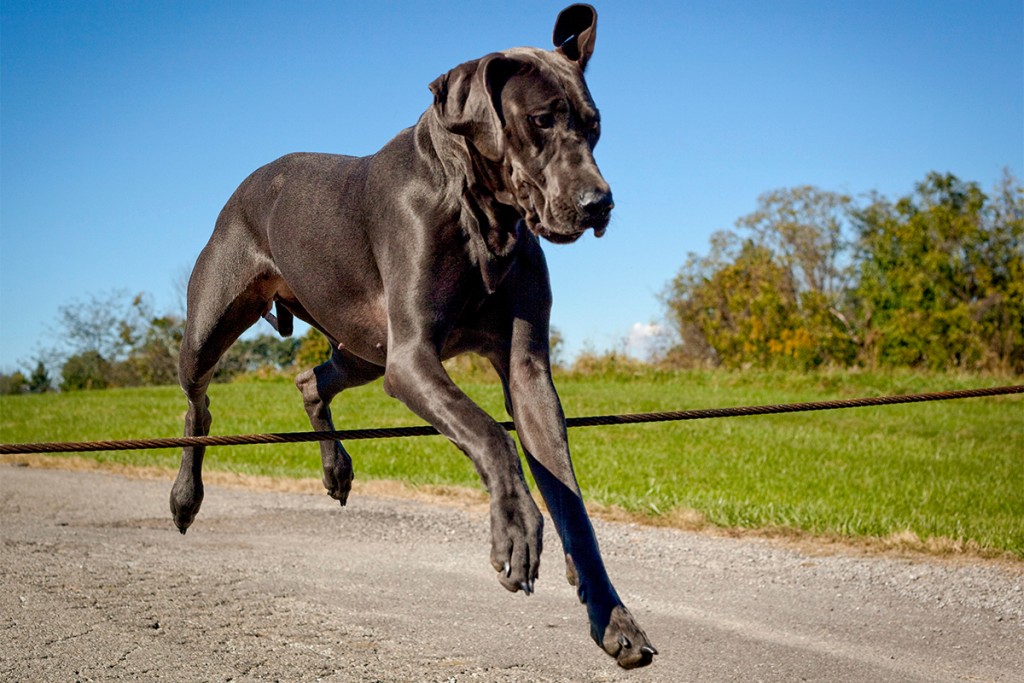
Great Danes are some of the most popular giant dog breeds in the world, and not just because of Scooby-Doo! They are loyal, great guard dogs, and also have incredible personalities. Though they may be great, pet owners have ample reason to get a little concerned about their behavior–or potential to run away.
Great Danes have the size and athletic ability to easily jump most fences, however, Great Danes who have been properly socialized and trained will have little inclination to jump fences.
Great Danes can be taught to behave well and avoid fence jumping behavior. Here’s how you can reduce the chance of your new Great Dane jumping a fence.
Do Great Danes Jump Fences?
If there’s one nightmare that every dog owner worries about, it’s losing their dog because the pup decided to jump the fence! Owning a Great Dane makes fence jumping a real threat, simply because they are so tall.
Great Danes are a breed regularly recognized for their ability to clear tall fences. They are also known for wanting to do this, especially if a female dog nearby is in heat or if they see an animal they want to chase.
This is why proper socialization and training are so critical to preventing this from happening.
How Big Of An Issue Is Jumping?
A Great Dane that jumps a fence is a Great Dane that can easily die as a result of its own actions. If your dog clears the fence, they can get lost, hit by a car, or worse, attack another dog. It’s a serious issue.
As a dog owner, you owe it to yourself, your dog, and your neighbors to prevent your pup from jumping the fence you own. It’s a matter of safety, liability, and more.
How High Can Great Danes Jump?
Though Great Danes are not the highest jumpers in the canine world, they still can clear a very tall fence. Most Great Danes can easily clear a five-foot-high fence, and plenty can even go as high as six feet.
So, what does this mean for pet owners? Well, if you were hoping that your four-foot-tall wire fence would keep a Great Dane in, we’re sorry to tell you that it’s not going to happen.
The good news for you is that while they can jump an average-sized fence, it only really matters should they want to jump it…
How To Prevent Your Great Dane From Jumping The Fence
Great Danes are big-time jumpers. They will jump on people, over fences, and even jump from side to side during playtime. Thankfully, there are ways to prevent your Great Dane from jumping fences, including:
- Training. Teaching your dog not to jump on people or fences is a smart way to avoid jumps.
- Installing A Good Fence. Getting the right fence can negate the problem altogether.
- Avoiding Jump Triggers. Keeping your dog away from other dogs in heat can be a smart choice.
- Exercise. Dogs that are tired are dogs that won’t want to jump.
Training Your Dog To Avoid Jumping
The best way to keep a Great Dane from jumping a fence is to teach them to avoid it when they are still puppies. Here’s a quick routine that can help your pup learn to see jumping as bad quickly:
- Watch for jumps! When your Great Dane puppy starts to look like he’s about to jump, grab his front paws.
- Hold his paws for a while. Staying on your back legs as a dog is not comfortable. Hold his paws until it’s clear he wants down.
- Release his paws. Let him get down to the floor.
- Continue doing this until he learns. One time alone isn’t enough! This has to be a pattern in order for your Great Dane to break his interest in jumping.
On a similar note, giving your dog a treat on days he doesn’t jump can also help reinforce the training. If your Great Dane continues to jump, it may be a good idea to consult a professional trainer.
Resource Tip: Jumping is just one of many issues that can plague Great Dane owners… If you’re looking for a resource that clears up ALL of the most common questions, then you need to take a look at the Great Dane Puppy Handbook!
When Should You Look Into Professional Training?
If you have been working hard to train your Great Dane to avoid jumping fences without any luck, you might be wondering if professional training is right for you. Here’s what you should consider before you dial a pro:
- Time. It can take up to six months for a dog to get trained. Are you sure you don’t want to keep trying?
- Age. Adult dogs can be harder to train than younger ones. This is especially true with dogs that have been abused or neglected in the past. If your dog had a hard life, a pro trainer’s touch can help.
- Methods. Have you tried other methods aside from the ones in this article before you made this decision? There’s more than one way to teach a dog, and there is also more than one way to prevent jumps.
If you’ve been having serious problems with your Great Dane’s behavior, you might want to look into professional training.
How High A Fence Do You Need To Prevent Great Danes From Jumping?
Ideally, your Great Dane will be socialized enough to avoid trying to jump fences during his puppy days. However, not all Great Danes are easy to train, and some just really love to jump a little too much. Getting a good fence for your dog is a good idea. Here’s what to look for:
- Go for wood privacy fences. Chain link fences are prone to leaving your dog open to theft and can also be easy for Great Danes to climb. The same can be said of wooden “ranch” fences.
- Avoid “silent fences.” Silent fences are also known as invisible fences and use electric shock collars to keep pets in your home area. Not only is this painful for your dog, but it also is something they can ignore if their desire to leave is strong enough.
- Aim for a height of at least six feet. This is a good way to make sure that your dog will have a harder time climbing fences.
If you aren’t sure what type of fence is ideal for your dog or just want to get good advice about your pup’s fencing, talking to a qualified dog trainer can help.
That being said, training is always the best way to reduce risk.
Avoiding Jump Triggers
Anyone who’s ever owned a dog knows that there are certain things that just get dogs going. Knowing what excites your dog and triggers them to start jumping around is crucial.
By reducing their chances of having jump triggers, you can make it easier to keep your dog safe.
A little observation and common sense can go a long way here. For example, if your Great Dane tends to start chasing after dogs and cats, keeping them indoors during peak walking hours can help.
If your Great Dane gets excited by kids, avoid hours when children walk home from school.
Obviously, not all triggers can be prevented. For example, you really can’t do much about neighborhood squirrels scurrying past your home. Even so, a little prevention can go a long way.
Exercise And Supervision
If your Great Dane is still jumpier than Scooby, then don’t worry. There’s still one last thing you can do: get him more exercise! Grab a leash, go on a run with him, play tug-o-war, and wear him out!
Still having a jumping problem? Then, let him have his yard time while you watch. A dog that’s tired is far less likely to try jumping a fence. Even if he does, your watchful eye will help prevent him from getting too far.
You can also make sure of GPS tracking collars as a backup way to ensuring that you are able to locate them in the event that they do escape. Here’s a link to a review of the best tracking collar that we’ve ever tested.
Fi’s smart dog collar creates a new breed of dog collars, offering GPS location (with escape detection) and activity tracking for your dog. The most advanced pet tracker in the market, the Fi Smart Dog Collar offers the longest battery life of up to 3 months and best location coverage in the US!
Of course, this does not solve the jumping problem. However, it’s better than no backup plan at all!



Thank you, for the stop Jumping on you advice. We do walk her backward and she does not care for that either. The problem is consistency and we have to work on that. For the most part she is a mini gentle giant for now, only 110 lbs.
I can’t walk my Great Dane
Until he was 2 he was fine
My daughter walked him one time and after that he rolls and pulls and I can’t walk him anymore
He pulled me over and I had all I could do to hold on to him so he would not get loose
It was a nightmare
I can walk him to the van just fine and back to the house
I am a senior now and love ❤️ him so much
He only knows means my daughter now before I took him all over including shopping in pet smart
He is mostly housebound now stays in the van when I run into the stores
I do have a pet sitter he does not care for
I think it’s because he knows I am leaving the house without him
It’s not the worst thing in the worldI just wish I could safely walk him, I would be devastated if he ever got loose
He gets the zombies a few times a week then breathes hard
Another Great Dane owner said she uses a shock collar when she walks her dog.
I do not think my dog would respond well to that.
He is 4 years old and very smart, he is a planner and seems to understand many words.
Any suggestions on how to safely walk him?
Hi Samantha Sue!
I think that a chest/body harness or gentle leader would be a great solution for you! These types of harnesses help stop pulling by redirecting their body or head whenever they pull. I have found that this makes it much easier to work on “heel” and leash training.
Check out a front pull harness like the Walk Your Dog With Love. Pets are has one through Amazon but there are alot of adjustments on it and the sliding buckles can rub.
This is so informative, absolutely love reading all the articles.
I am a new owner, Maverick will be 3 months on the 5th November and I am so in love with him.
He is such a character and makes me laugh non stop !!
I only have one problem……
During the day he is awesome, keeps himself busy, playing, exploring huge property, sleeps when he wants to, so in general a very good puppy.
Until we get to bout 18:00 and I get comfy on couch, he kinda goes into a frenzy, crazy tough and rough biting and tackling, which I am sure in his mind is playing, but oi vey, the bites are very intense and no matter what I try he wont stop !!
What can I do, please help.